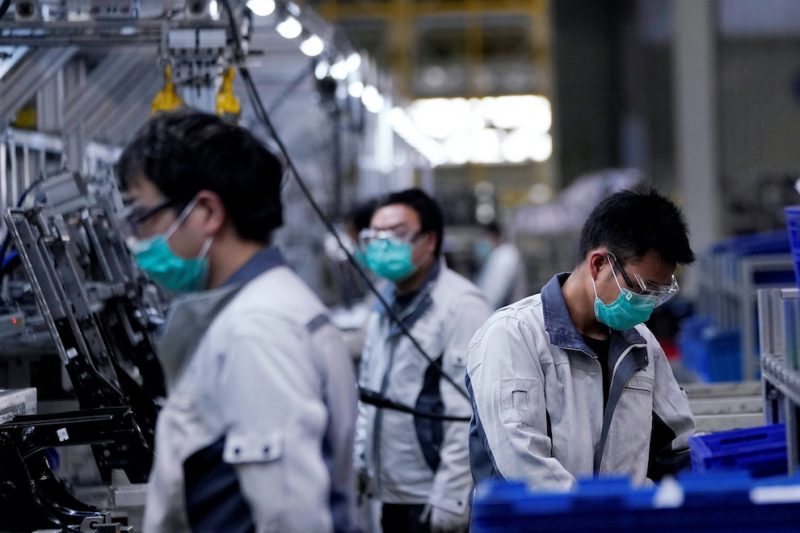China’s economy faltered in July as factory output slowed, a property slump deepened and manufacturing employment plunged.
The Caixin/Markit manufacturing purchasing managers’ index (PMI) eased to 50.4 in July from 51.7 the previous month, according to a private poll released on Monday that showed manufacturing activity grew more slowly than expected.
A subindex of the Caixin survey showed factory jobs slumped to the lowest level in 27 months. Companies attributed the fall to cost-cutting, subdued sales, and the non-replacement of voluntary leavers.
Also on Monday, a poll by China Index Academy, one of the country’s largest independent real estate research firms, showed property sales by floor area in 17 cities tracked by the company slumped 33% in July from a month earlier, versus an 88.9% post-lockdown jump in June, amid a mortgage payment boycott on unfished projects.
The developments followed a shock contraction in the official manufacturing PMI on Sunday. It swang to a reading of 49.0 in July from 50.2 in June.
“Stagnation is what everyone is worried more [about] after the second quarter GDP fell into a hole,” said Nie Wen, a Shanghai-based economist at Hwabao Trust.
The country’s top leaders last week signalled their willingness to miss the officials growth target of around 5.5% for 2022, a year in which President Xi Jinping is expected to secure a precedent-breaking third leadership term.
Second-quarter gross domestic product grew just 0.4% from a year earlier, but authorities have so far refrained from massive stimulus, despite fears of a global recession, uncertainties from the Ukraine war, and the prospect of recurring Covid lockdowns at home.
ALSO SEE: US, Japan Chips Alliance Aims to Thwart China Ambitions
Staff Shedding
“We’ve shut down at least 10% of the factories in Jiangsu so far, and more than 80% of employees have been laid off,” said Xu, general manager of a furniture maker in Jiangsu province, declining to give his full name. “Although the situation has improved Covid-wise and market-wise, we haven’t seen a significant rebound in sales.” Sales are now just half of the usual annual pace of 100 million yuan ($14.8 million), Xu added.
Continued weakness in the property sector in the medium to long-term will impact the entire economy and people’s livelihoods, warned Hwabao Trust’s Nie.
A Beijing agent surnamed Lu at Lianjia, a top real estate brokerage company, said some households are selling their homes in the capital to raise cash.
“A home seller is currently wanting to sell an apartment worth 6 million yuan in northern Changping district because a reduction in income from his job has increased the pressure on his ability to repay 4 million yuan due in mortgage loans,” Lu explained. “There are also some potential home buyers who have chosen to postpone their purchases because of the instability of their jobs.”
The sector was similarly pressured in 2015, but policymakers had allowed a rise in household leverage to prop up the market at the time, said Nie.
In 2015, China‘s economy missed the government’s growth target after a stock market rout, an imploding shadow banking sector and the plunging property market.
“But at that time, consumption was still steady, not like this year,” he said.
- Reuters with additional editing by Jim Pollard
NOTE: This report was updated with further details and a new headline on August 1, 2022.
ALSO SEE:
China to Focus on Consumption Boost to Turn Around Economy
Xi Targets China’s ‘Unbalanced’ Growth Over Next Five Years
Foreign Investors Exit China Bonds for Fifth Straight Month
























